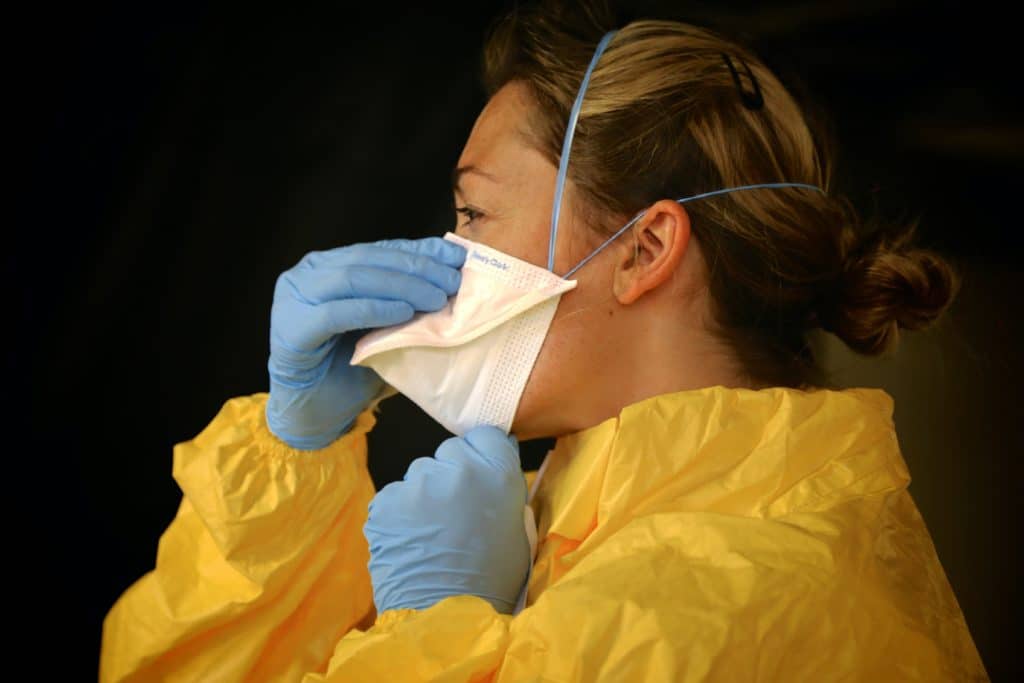4 Min Read
Moral Injury and the Toll It Can Take on a Medical Professional’s Mental Health
The ongoing coronavirus (COVID-19) pandemic continues to dominate worldwide news and change the way people everywhere live, work, learn, and interact with others. The World Health Organization’s classification of the COVID-19 outbreak as a pandemic prompted experts to call for social distancing, quarantining, and self-isolation. This resulted in local, state, and federal leaders enforcing stay-at-home orders.
The orders to stay home resulted in a rise in telemedicine. Telemedicine enables healthcare providers to connect with patients via phone, video, and email in real-time, yet from afar. Along with the use of electronic health records, physicians can make decisions about diagnoses, treatment options, prescriptions, and more. However, not all healthcare workers can provide care remotely.
According to the stay-at-home order, essential personnel have a responsibility to maintain their work schedules. For many healthcare professionals, this means they must remain in the workplace. Healthcare providers’ dedication to their roles continues to receive tributes from those in their communities, as noted in publications like The New York Times, and television and YouTube advertisements.

Front-Line Workers’ Mental Health
Healthcare professionals are crucial front-line workers who put themselves and their family members at risk each time they go to work. The quick spread of COVID-19 and the shortage of medical supplies desperately needed by healthcare workers–as documented by Time–make the present health risks more severe for these front-line workers.
The ongoing pandemic puts the spotlight on the physical, emotional, and mental health problems that medical workers may face. A severe threat to mental health that some medical professionals experience is known as moral injury.
What is Moral Injury?
Many researchers, including psychiatrist Wendy Dean, study the concept of moral injury. Moral injury is defined as intense psychological distress following a violation of one’s ethical or moral code.
It’s believed that moral injury goes beyond burnout, which is a known problem many healthcare professionals face. In general terms, burnout refers to cynicism, perceived inefficacy, and exhaustion stemming from long-term job stress. Components of burnout include depersonalization, emotional exhaustion, and a decreased perception of personal accomplishment. Burnout can impact the well-being of medical workers as well as the quality of care of their patients.
Moral injury can occur when a professional is forced to act in ways that go against their moral beliefs. Moral injury can also occur when they bear witness to or fail to prevent actions that violate their moral code. Examples of potentially morally injurious events include omission or betrayal by leaders or trusted individuals.
Experiencing a morally injurious event may result in feelings of guilt, disgust, or shame, or negative thoughts about oneself and others. It isn’t a mental illness on its own; however, it could contribute to the onset of mental illness.
Moral injury has garnered comparisons to the post-traumatic stress disorder (PTSD) experienced by many service members. As documented by the National Alliance on Mental Illness, the Department of Veterans Affairs likened moral injury to PTSD, as it stems from an experience that can trigger inner turmoil.
While studies examining moral injury typically involve military service members, moral injury can impact people of various professions. Researchers identified significant associations between moral injury effects and mental health diagnoses such as PTSD and depression. These associations held up not only in military personnel but teachers, and others as well.

Find a Therapist for Moral Injury as a Medical Professional
Get personalized matchesHealthcare Professionals and Moral Injury
Medical professionals have an increased risk of moral injury in situations involving the loss of vulnerable patients. This can include children, the elderly, or patients with COVID-19. Treating COVID-19 patients can cause moral injury because fatalities are likely, especially amid a shortage of medical equipment and resources.
Additionally, medical workers are at increased risk of contracting the virus due to consistent exposure. Such workers may experience moral injury due to perceptions that their health and safety are not being prioritized by their employer. Lack of social support may also increase the likelihood of moral injury.
Studies reveal that even though medical professionals are at a higher risk for moral injury and adverse mental health effects, they are less likely to seek help. Moral injury can potentially end the lives of those who struggle with it, which is why medical professionals would benefit greatly from the help of mental healthcare providers.
Medical workers need support, compassion, and care, especially during this time. Healthcare providers who need help finding a therapist, by phone or online, can turn to WithTherapy.
Getting help, guidance, and the tools needed to cope are all crucial to enduring this pandemic. WithTherapy supports healthcare providers who are struggling, feeling anxious or depressed, or are fearful about contracting the virus. This dedicated service understands that mental health professionals’ responsibilities to their clients must remain constant amid the uncertainty of COVID-19, just as medical workers’ duties to their patients remain constant.
Finding Therapy
Understanding medical professionals’ susceptibility to moral injury, With Therapy connects medical workers to mental health providers.
WithTherapy pairs licensed mental professionals well-versed in mental health treatment with those in need. This includes the availability of specialized therapists who can help those with comorbid mental illness or trauma, cope with their past and present while adjusting to the COVID-19 pandemic. This essential resource provides medical workers with mental health professionals that suit their specific needs.
Medical workers, who work tirelessly to take care of others, owe it to themselves to take care of themselves physically, emotionally, and mentally.
Find a Therapist for Moral Injury as a Medical Professional




